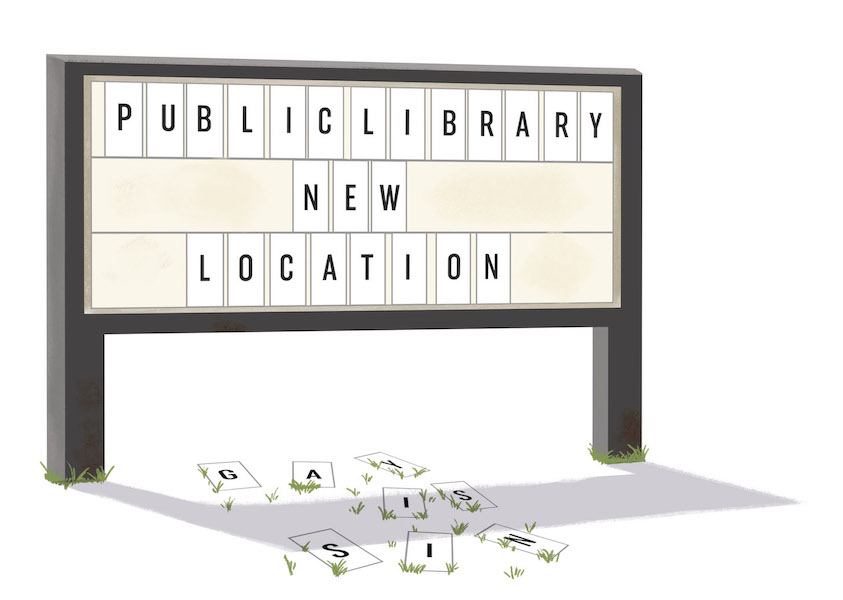The Salem Public Library was built in 1904 to serve the community by providing equal access to information—however, citizens who pay taxes in Oregon unknowingly support Salem Alliance Church as well.
Over the past 116 years, the public library has grown into a place with free internet connection with computers and printing available, a Discovery Room available for kids who want a tangible learning experience, the Summer Reading Program—which instills reading habits in children while they are not in school—and so much more.
Now, the library is going through some changes. On the wall leading downstairs, staff posted up a paper tree inviting patrons to write down memories onto leaves. Down the carpeted stairs, the once computer lab is filled with boxes of storage, and the popular Teen Scene is closed, the only available room being a restroom and the empty Anderson Room(s).
Due to the growing concerns surrounding the megaquake that will eventually happen from the Cascadia Subduction Zone, the Salem Public Library was approved for a $18.6 million bond, paid for by Oregon taxpayers, to undergo a seismic retrofitting of the building. A Salem Library Improvement Project board was assembled in 2017 and have met monthly to discuss the progress in the renovation and relocation for the Salem Public Library.
The Library Renovation Council Subcommittee meets monthly to go over budget information and general inquiries from the public. The library will temporarily be relocated to a Broadway building currently owned by Salem Alliance Church, which was not known when the bond passed in 2017. The former Capital Press building which will hold the interim library is going to cost $19,000 a month, a controversial lease agreement which nearly 300 people have signed a petition against.
Putting a public library, even if it is temporarily, in a space owned by a church is problematic. Point blank. Even if the Broadway building “met city criteria,” it raises questions about whether it is ethical for Salem Alliance Church to own, and therefore lease the building to the City of Salem. Will Salem Alliance Church be exempt from paying taxes on the building, since they are a church? And, consequently, will the $19,000 monthly rent go straight into the pocket of Salem Alliance?
In December of 2019, a whistleblower accused the Mormon Church of stockpiling $100 billion, skipping out on taxes and misleading members of the congregation. The numbers are obviously not as high in this situation, however the relation stays the same—how is it ethical for taxpayers to give their money to a church without their consent? The Oregon State Bar says it is legal for religiously affiliated businesses to engage in discrimination against LGBTQ+ people, however that does not make it right. And it certainly does not mean that a public library can allow jurisdiction to follow through.
This is not the first time Oregon taxpayers have been dealt a shorthand and paid the consequences later. The City of Salem has experienced budget shortfalls increasing by the hundred thousands since 2017, with a city savings account to run dry by the year 2023. Salem’s elected leaders spent millions of dollars getting two fire stations restored, as well as opening a homeless rental assistance program. Neither of these expenditures were responsible for the long term, putting the extra taxes and fees on taxpayers.
In an interview after the meeting adjourned, Sarah Strahl, library administrator for the board, said, “People’s main concern with the interim library’s landlord is that the message of inclusiveness will change. That is not the case. We are still Salem Public Library in any space that we go to.” Strahl mentioned the subcommittee’s meeting with the Salem Human Rights Committee in a good light, however the statement from the SHRC on the library’s relocation tells a different story:
“The Salem Human Rights Commission is deeply concerned about the proposed lease of the property owned by the Salem Alliance Church for the temporary location of the Salem Public Library. The Commission respectfully requests that the City review the available properties for other potential options, and select another location, even if that location is not as ideal in cost or operations,” said Danielle Meyer, Chair, on behalf of the Human Rights Commission.
Despite public concern, the Broadway building was pushed through as the only viable option, with the construction of the new library beginning March 23. The subcommittee prepared for the opening of the interim Broadway library on March 14, which was jovially repeated in accordance to “Pi Day,” with party planning including pie for earnest library-goers.
When Lois Stark, Library Advisory Board member was asked about the importance of acceptance, she said, “We are here for the whole community, no matter what. I think this whole discussion has been good for the community because it makes us ask ourselves if we are inclusive. And I think those questions are important, being self aware.”
